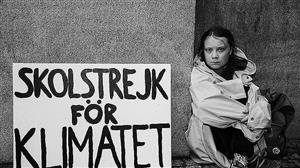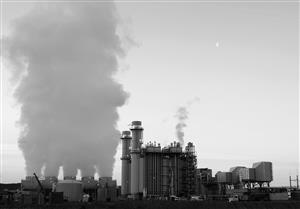We need to talk: acknowledging climate change
BY CHARLOTTE SHAW, KALEIGH KING AND HAILEY CLAYTON
JHT Staff Writers
Climate change is happening all over the world. The Earth is dying from too much carbon dioxide in the atmosphere. One of the main causes is the burning of fossil fuels for energy. According to the Natural Resources Defense Council, fossil fuels “are harming the environment and our health.” Climate change affects us all.
Greta Thunberg is a teenage environmental activist from Sweden who travels around the world to express her feelings about climate change, trading a school desk to work against the climate crisis. Thunberg sails to get to each destination. In an interview with The Guardian, her dad, Svante Thunberg, said she struggled with depression for three to four years. In 2019 she decided to act to change atmospheric conditions, which helped her depression.

According to climate.nasa.gov, ice sheets around the worldare melting at a very fast rate. When ice melts it adds more water, causing the sea level to rise. In the future this could set the world under water.
That includes John Hopkins Middle School. Sixth grader Will Shaw shares his knowledge about climate change: “It’s destroying the world because factories are polluting everything, and it’s making the world super warm, which is causing ice to melt, and causing forest fires like the one in Australia.”
The environment is not the only one being affected by climate change. More than 200 animal species are going extinct every day, according to experts. Thousands of penguins are going extinct every day. Polar bears in the Artic need sea ice to hunt seals, which makes up 95 percent of their diet, but end up starving due to the ice melting.
National Geographic states, “Climate change is doing widespread and consequential" harm to animals and plants, “which are struggling to adapt to new conditions.”
Natural climate solutions get just two percent of all the money being used to tackle climate breakdown, according to conservation.org. People around the world are ignoring fossil fuels. The main cause of climate change is coal, oil, and gas. “We have far more oil, coal, and gas than we can safely burn,” says Duncan Clark, visiting researcher at the UCL Energy Institute, for The Guardian.
However, there are many ways we can help. Thunberg, who was the Time magazine Person of the Year for 2019, says all governments need to “protect, restore and fund” more climate solutions. She says, “it’s very simple.” In other words, don’t cut down trees, and replace your regular light bulbs with florescent light bulbs.
Nature is a tool we can use to replace our broken climate. Nature can regenerate and help our ecosystems bounce back. The BBC notes that “tropical forests are being cut down at the rate of 30 football fields a minute.”

A tree is an example of a natural climate solution. It sucks carbon out of the air, costs very little and builds itself. Mangroves, marshes, sea groves, peat bogs and jungles all help with restoring the climate. “Right now, when we need nature we are destroying it faster than ever,” says Thunberg in a short film about the climate crisis, produced by environmentalist George Monbiot.
Another part of the solution is to “shut down greenhouse factories and use windmills,” J.Hop scholar Shaw said. Other ways you can help is to include carpooling, or replacing your car with walking or bike riding.
Thunberg is not the only young person dedicating her life to stopping climate change. Kids all over the world are protesting climate breakdown. They skip school every Friday because they argue climate change is robbing them of their future. This action is called “Fridays for Futures.” It has become a global movement inspiring many students to fight for climate action.
“We have to treat climate change as what it is – an emergency,” said activist Audrey Maurine Xin Lin in an interview with USA Today.
The J.Hop Times staff is committed to doing what we can to be part of the solution. We believe change starts with each person’s decision, and actions speak louder than words. That’s why we’re proud to announce our spring issue will be completely online, at pcsb.org/jhoptimes. This will save trees and reduce the use of chemicals and energy. Watch for it in the coming months.

